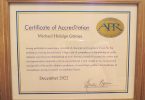The other day, the head of a well-respected New York firm delivered a blistering critique of the Accredited in Public Relations (APR) credential on his blog. Somewhat curiously, a similar outburst appeared on his partner’s blog a day later.
PRSA admittedly has had its challenges in trying to establish the value of the APR mark in the minds of agency hiring managers, which is something we’re working to change. But, we’re always surprised when we run into someone who is against the ideas of self improvement, learning and recognition for those efforts — ideals which are fundamental to us as Americans.
I get the argument that some of the best and most relevant experience can be gained in the workplace, but take a look at the bigger picture. Traditional media and bloggers are calling out our industry and its professionals and mocking bad pitches. Practitioners are providing bloggers with free products without ever disclosing the quid pro quo when editorial coverage results.
How can you argue that the workplace couldn’t use some assistance in educating its employees?
This is where the APR’s emphasis on continuing education helps, both through its focus on practical areas that should be a part of any good practitioner’s toolkit — things such as research, audience segmentation and measurement — to standards of professional conduct and ethical decision making. Knowledge is power at any time, but especially in a down economy.
The APR is also more than a test of knowledge. It’s a community of professionals who are dedicated to mentoring, sharing and building the industry’s knowledge base. In addition, the credentialing process moves public relations closer to getting its full due as a profession.
That’s right. Read “Effective Public Relations,” the seminal public relations text by Cutlip, Center and Broom (something most APRs have done, by the way).
“For public relations to achieve professional status, there must be specialized educational programs, a body of knowledge, community recognition, individual accountability and commitment to abide by established codes that protect the public interest and spell out social responsibility,” it reads.
PRSA members come from all walks of life, from all parts of America. Some work in large corporations, some are sole practitioners. Some live in big cities, others on the plains and prairies of rural America. While their backgrounds, motivations and needs are all different, thousands have embraced the process of structured learning and testing embodied in the APR mark, which they proudly display as part of their professional accomplishments. We find it fascinating that the heads of a single big-city agency presume that their views are somehow defining for others.
Those of us with college degrees list them on our resumes. Those imprimaturs serve as marks of accomplishment, but also represent only part of our qualifications, which are gained through our life experiences, our personal and professional encounters, our moral compasses and elsewhere. Thousands of APRs across America proudly display the APR mark — as they do their other qualifications — because it is one of their many accomplishments. It speaks volumes about their commitment to learning and professional success, and to moving our “profession” closer to the status, recognition and respect it deserves.
Michael G. Cherenson, APR, is PRSA’s 2009 Chair and CEO.







Michael —
May I suggest you provide a link to the critical blog you are referencing? In this era of social media and increased communications transparency, the absence of it in your column undermines your position.
Sure, it’s negative — but by sharing the link, you will do three things:
1. You will practice good, two-way communication, by allowing your readers to judge for themselves the merits of the author’s argument
2. You will reflect the communications norms of the day, in which transparency and the encouragement of discussion (even disagreement)is increasingly the preferred outcome
3. You might spur some other defenders of your position to weigh in, as well.
I’m a proud APR myself. But it’s hard for me to blindly support your position without having the opportunity to judge for myself whether the blog is as offensive to our profession as you say it is.
Thanks.
Anne
Hi Anne,
Thanks for your comment. We debated back and forth about linking to the two blogs that were critical of the APR mark. On the one hand, you make several good points; on the other hand, it’s restating the negative.
Since you asked, here are links to the two blogs: http://bit.ly/VDtWy and http://bit.ly/2DXvK4. I’d love any additional thoughts you have after reading them.
Kind regards,
Michael
I did not see the blog in question, but I would suspect that the same executive who blasted APR designation would be proud to have a PRSA Silver Anvil Award on his shelf. The roles of a trade association are many, but validation of individual and team achievement is important. Just as agencies clamor for those awards, they should be just as focused on making sure their people receive the basic validation that marks them as true professionals. In our business, it’s APR. While the designation has taken quite a while to mean something, it has to have broad acceptance in our profession if it’s going to mean something outside of the business. I’ve had APR next to my name since 1990, but in the past three years, I’ve actually started to see the benefits in enhanced perceptions among professionals outside of communications.
Michael,
Thanks for the well stated points you give concerning the APR. I’m curious as to what prompted the rant from the firm’s CEO on APR? It is human nature, unfortunately, to sometimes try to derail those who are interested in further education and continuing best practices in communication.
I can say personally ath the APRs I have worked with have always represented PR in a most professional way. However, I cannot say this about nonaccredited PR persons. That, in itself, is a pretty interesting observation. Thanks for taking the time to help educate about the benefits of being accredited.
I was a 15 year veteran of corporate and agency PR before I took my APR exam. The text and material helped remind me of PRs complete values, ethics and benefits for my clients. The exams weren’t easy and challenged all I knew about PR. I was a low point in my career, disappointed by the emphasis on publicity only and not the other elements PR can bring to the party. Going through the APR process helped reinvigorate my career and professsional commitment.
Having and maintaining an APR has not helped me obtain, keep or market for a client. It hasn’t impressed any of the agencies I’ve worked with nor the students I’ve taught. APR wasn’t for them, it was for me. And I’m honored to state the APR status on my resume.
Yes, the APR does matter, particularly in these times. I have worked with one client for more than 10 years, providing them primarily with my writing and editing skills, along with helping them with their community relations. Now I am focusing more on the latter — including serious strategic and PR planning, external and internal relations. Their awareness and appreciation of my APR standing (and the importance of further fostering external relationships in a changed business climate) helped me move from one function to another for them.
Excellent post in defense of APR, a credential taken quite seriously by those of us who have taken the time to study, prepare for, and pass the examination. It’s also very important to note that Mike Cherenson, this year’s PRSA Chair and CEO, leads by example as a holder of the APR credential himself.
In an economic environment where budgets for public relations and other “non-revenue” services are in decline, why in the world do some professional PR practitioners continue to resist the idea of differentiating themselves by demonstrating that they have an additional level of competence and education? Maybe they are afraid that clients will recognize that professional credentials mean something!
Well, Mike, you were doing okay there until the last paragraph.
College degrees usually require years of study, a certain amount of time in residence, and much more than simply passing a multiple-choice examination one afternoon without demonstrating any qualification to take the exam other than payment of a fee.
Jack O’Dwyer correctly points out that APR is no longer a professional credential but a political party within PRSA. Indeed, they are much like the old Commissariat: supressing dissent, resisting change, and silencing or eliminating critics in a desperate attempt to hang on to power.
Good morning, Bill,
Thanks for dropping by our blog. We’re pretty familiar with your views about PRSA, having read them posted frequently to Jack’s Web site. But seriously, Bill — a full blown conspiracy involving APRs trying to “silence” and “eliminate” critics, to “suppress dissent” as they “hang on to power,” with comparisons to the former Soviet Empire? Colorful, yes, but pretty farfetched.
There’s more to our organization than what Mr. O’Dwyer points out, which more often than not is incorrect or unnecessarily negative. For example, one of the bylaws changes that will be brought forward at this year’s National Assembly, as part of a broader set of governance reforms, is an expansion of the qualifications for Board Service. Under the proposed changes, APR would become one of several criteria that would qualify a public relations professional for Board service, along with industry experience and other factors.
Not exactly the stuff of a conspiracy theory.
Excellent observations, Michael. And, I do appreciate your comments about my firm. But, you overlook several key points in your defense of the APR:
1) My blog was in response to an unsolicited spam e-mail from PRSA pitching an expensive, four-day boot camp for APR training.
2) I’m sure there are some great people who’ve earned APRs. But, that doesn’t make them better PR professionals. It’s an ersatz credential that our industry attempts to package as being the equivalent to the rigorous exams required of doctors and lawyers. It’s not remotely close.
3) Clients could care less about the credential. And, as I said in one of my posts, I’m not aware of any PR firm of substance that requires an APR of applicants.
Also, the reader who equated an APR with winning a Silver Anvil is mixing apples with oranges. I’m proud of my Anvils. They mean one’s program has been carefully vetted and found to be “best in class.” The APR means a PR person has passed an SAT-type test. Period. Big deal.
The social media-driven business world in which we live is rapidly passing us by. Those practitioners who cling to outdated, unimportant credentials as proof positive that they’re PRs equivalent to doctors and lawyers will soon find themselves gone with the wind.”
Steve, if it’s the “unsolicited” email that bothers you, all PRSA members are given the option to opt-out here: http://bit.ly/qDFvv.
Having never pursued the APR credential, I’m not sure how you substantiate your comments. We never said that becoming an APR is to public relations what years of medical school is to becoming an MD. What we’re saying is that the process of becoming an APR will make a good public relations professional better.
In addition to the exam, the APR credential involves a face-to-face readiness review, which determines whether or not you have a grasp of the knowledge, skills and abilities required to pass the APR exam. You must also complete a readiness review questionnaire, with questions such as “Describe how you would, if given unlimited resources and authority, improve the process by which public relations programs in your organization are developed, approved and measured.” Not exactly picking (a), (b), (c) or (d). Finally, you need to assemble a professional portfolio, all before even sitting for the exam. Having passed the test, there are continuing education requirements — which evolve alongside the profession and technological advances — that must be fulfilled in order to maintain the credential.
If your clients could care less about APR, I’d like to understand exactly what they know about it, and why an expanded body of professional knowledge and a demonstration of professional competency don’t matter to them. If you offered those who are familiar with the process of becoming an APR the choice of two otherwise equal account directors — one with APR and one without — I can’t imagine that they’d ask for the one without it.
I was also looking for a link to the blog. I believe this is the posting Michael was responding to:
http://www.repmanblog.com/repman/public_relations/
There’s nothing wrong with expanding one’s knowledge. But, I really question whether the cost (in time) is worth the end benefit here. I’d much rather focus my people’s time on obtaining critically important real life, professional experience.
After I wrote my post, no fewer than five clients called or emailed me to concur with my argument. One decided to comment directly on my blog. He’s been in the industry for 3 years and still can’t understand why there is so much focus on a standard that doesn’t mean all that much. In my opinion, Steve’s third point is entirely accurate. With over 20 years in the industry, I can’t remember one client or prospect every utter A…P…R.
I have nothing against those in the industry who choose to pursue the APR “degree.” If it makes you a better practicing professional, great. But, we at Peppercom seem to be doing just fine without it.
Thanks for your comment Ed, though it’s not surprising that your clients share in your and Steve’s opinions on the subject of APR.
A recent blog post by Bob Dittmer, director of public relations graduate studies and public relations sequence coordinator at Indiana University-Purdue University Indianapolis, makes the point eloquently that continuing education — in addition to experience — is essential for creating “well-rounded professionals”:
“A professional career should be advanced through three components: Formal education, professional development, and experience. Formal education is provided by colleges and universities via undergraduate and graduate degree programs; experience comes from actually providing public relations services and learning from those experiences; and professional development comes from education through workshops, seminars and Accreditation. This approach leads to a well-rounded professional who continuously advances their skills, knowledge and abilities and enhances the profession thereby.”
I am studying for my APR exam and have established a Twitter account (@aprstudytips) to share my efforts at addressing major issues before the exam. I would love the input of those of you who have passed the recent, computerized exam. Reading a recent press release that only 61% of those who took the exam passed is giving me the jitters. Please feel free to comment or post your advice on my blog or at Twitter.
I felt the Readiness Review Questionairre and the panel were very valuable to me at this stage of my career (20 years of experience). They helped me articulate my skills and goals for the future. I can only hope the preparation for computerized exam is as beneficial.
Best wishes,
Mary
Those who argue against or criticize the APR always seem to frame the issue as either/or. In their minds, if you do it, you might be taking away from some other aspect of your career or life. Obtaining accreditation makes no one worse and as many have said it helps them.
I have dealt with enough lawyers and other professionals who could care less about APR and haven’t a clue what it means, but when they see it on my card, if the topic comes up (and it frequently does in initial meetings) it gives me a chance to talk about my own serious approach to my profession. That is something they do care about. To be sure, APR makes no one a better professional, but it is one way to identify those professionals serious enough to take this extra step towards certification.
And last I checked, being accredited did not cause me to lose pace with the social networking media world as well.
To me, the real value of APR is what it does for the profession. The more often accomplished PR people become accredited and showcase their APR designations, they lend something of their own reputations to the profession as a whole. That’s how the vetting will start to take care of itself. We all know too many people who are posers to start with, and we have to live with their mistakes when clients get gun-shy because of bad experiences they may have had in the past with less than professional communicators.
Interesting choice to engage. Doing so was the only reason I ended up visiting Steve’s site to read the post (although I pop in to RepMan’s site from time to time).
And Anne’s original post is spot on. From the first paragraph, my only thought was “where’s the link?”
I’m currently writing a Social Media Best Practices policy for a client, and at the very top of the document will be a statement about transparency. If you’re going to engage, disclose the entire story.
I recently had a similar discussion after somebody over at http://www.groundfloormedia.com/ blogged about the value of the APR, and my takeaway was that it is what you make of it. I don’t know much about the internal politics of the PRSA, but spending some time and effort to take the test would at the very least inform my understanding of this industry and where it’s been.
Thanks for a great discussion.
The only concerns I’ve ever had with accreditation are that 1) PRSA members locally have not been able to tell me why, in practical terms, accreditation is valuable to me as a practitioner and; 2) given the content, it represents more of an entrance exam than the highest and best knowledge of the industry. Because of the latter, it may seem to place on equal footing both a very experienced professional and a relative newcomer who has simply mastered the study materials. There is no advantage in that for me, a 20-year plus professional.
[…] RE: APR Critics: Down With Education! […]